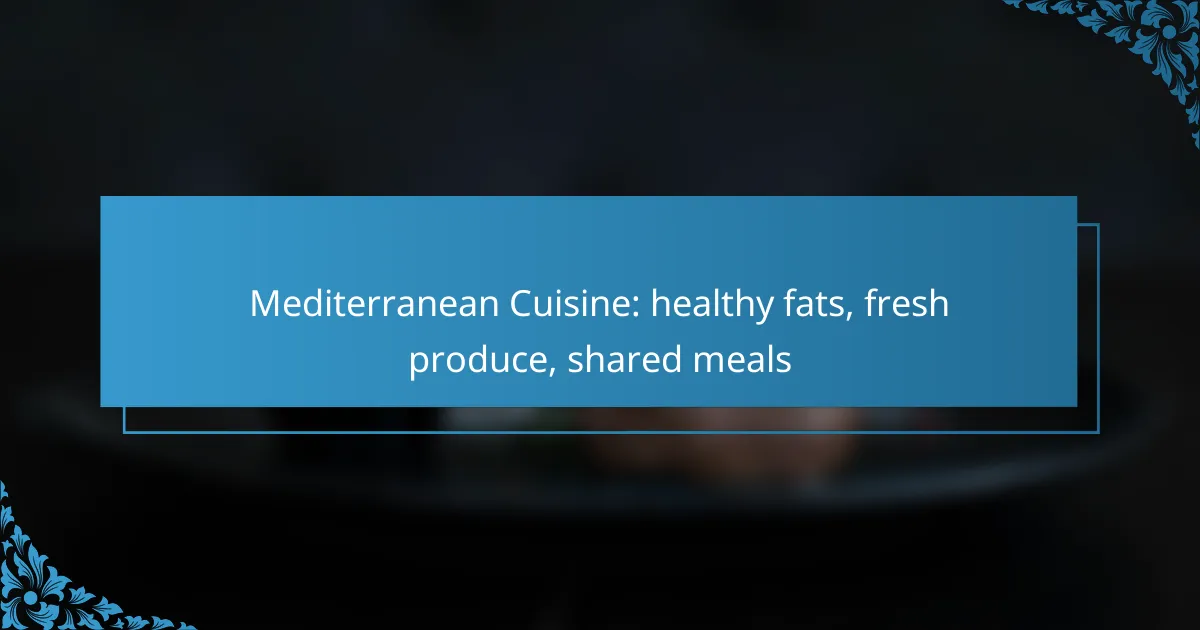Mediterranean cuisine is celebrated for its health benefits, highlighting the use of healthy fats, fresh produce, and the joy of shared meals. By focusing on whole grains, vegetables, legumes, and seafood, this dietary approach promotes balanced eating that is both nutritious and enjoyable. Embracing Mediterranean meals can lead to improved overall health and a reduced risk of chronic diseases.
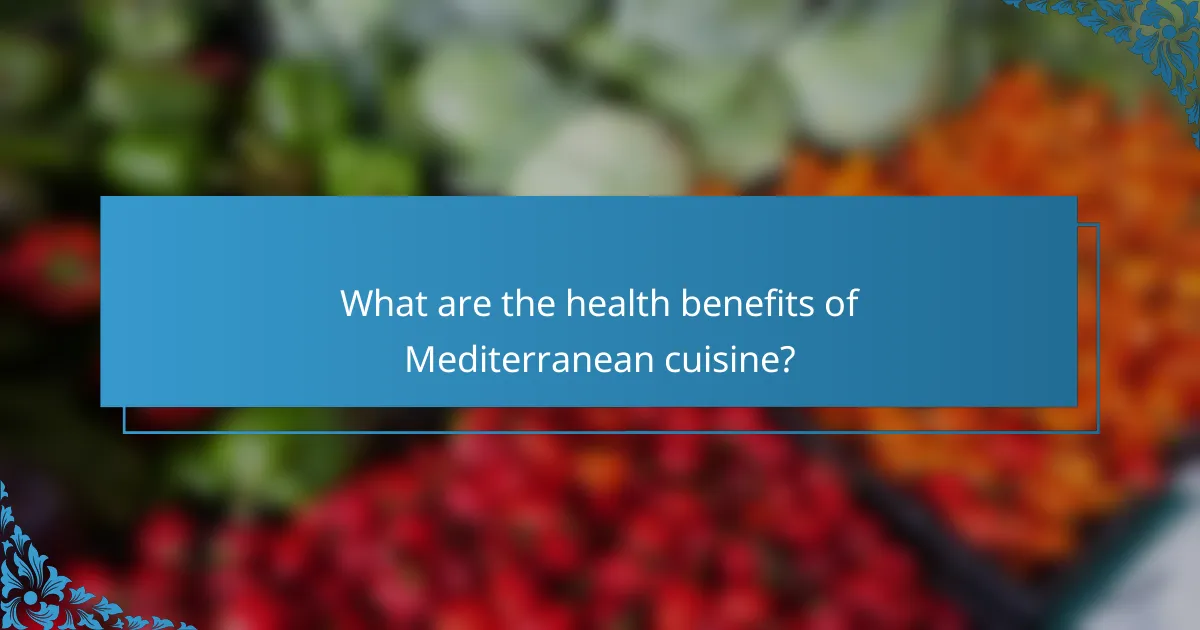
What are the health benefits of Mediterranean cuisine?
Mediterranean cuisine offers numerous health benefits, primarily due to its emphasis on healthy fats, fresh produce, and communal dining. This dietary pattern is linked to improved overall health, including reduced risk of chronic diseases.
Rich in healthy fats
Mediterranean cuisine is characterized by its use of healthy fats, particularly from olive oil, nuts, and fatty fish. These fats are rich in monounsaturated and polyunsaturated fatty acids, which can help lower bad cholesterol levels and support heart health.
Incorporating sources of healthy fats into meals can be simple. For instance, using olive oil as a dressing or cooking medium, snacking on a handful of nuts, or enjoying fatty fish like salmon or mackerel a couple of times a week can significantly enhance your diet.
High in antioxidants
This cuisine is abundant in fruits, vegetables, and whole grains, all of which are high in antioxidants. Antioxidants help combat oxidative stress in the body, reducing inflammation and lowering the risk of chronic diseases.
Common antioxidant-rich foods in Mediterranean diets include tomatoes, berries, leafy greens, and legumes. Regularly including these foods in your meals can contribute to better health outcomes and improved immune function.
Promotes heart health
The Mediterranean diet is well-known for its heart health benefits, largely due to its focus on healthy fats, fiber, and nutrient-dense foods. Studies suggest that following this diet can lead to lower blood pressure and improved cholesterol levels.
To promote heart health, aim to consume a variety of whole foods, limit processed foods, and maintain a balanced intake of fruits, vegetables, whole grains, and lean proteins. Engaging in shared meals with family and friends can also enhance the social aspect of eating, which is an important component of this lifestyle.

How can I incorporate Mediterranean meals into my diet?
Incorporating Mediterranean meals into your diet can be achieved by focusing on fresh ingredients, whole grains, and healthy fats. This approach emphasizes balanced eating that is both nutritious and enjoyable.
Focus on fresh produce
Fresh produce is a cornerstone of Mediterranean cuisine, providing essential vitamins, minerals, and antioxidants. Aim to fill half your plate with fruits and vegetables, choosing a variety of colors and types to maximize nutritional benefits.
Seasonal and local produce is often more flavorful and nutrient-dense. Consider visiting farmers’ markets or joining a community-supported agriculture (CSA) program to access fresh, high-quality fruits and vegetables.
Include whole grains
Whole grains are an important component of Mediterranean meals, offering fiber and essential nutrients. Incorporate foods like whole grain bread, brown rice, quinoa, and barley into your meals to enhance satiety and support digestive health.
When selecting grains, look for options that are minimally processed. For example, choose whole grain pasta instead of refined varieties to maintain the health benefits associated with whole grains.
Utilize olive oil
Olive oil is a key source of healthy fats in Mediterranean diets, known for its heart-healthy properties. Use extra virgin olive oil for cooking, dressings, and drizzling over dishes to add flavor and nutritional value.
When incorporating olive oil, aim for about two to four tablespoons per day as part of a balanced diet. This can replace less healthy fats, such as butter or margarine, helping to lower cholesterol levels and improve overall health.

What are popular Mediterranean dishes to try?
Popular Mediterranean dishes highlight fresh ingredients, healthy fats, and communal dining experiences. These meals often feature vegetables, legumes, grains, and seafood, making them both nutritious and flavorful.
Greek salad
Greek salad is a refreshing dish made primarily with tomatoes, cucumbers, red onions, olives, and feta cheese, all drizzled with olive oil. This salad is not only vibrant but also packed with healthy fats from the olive oil and feta, contributing to heart health.
When preparing a Greek salad, consider using seasonal vegetables for the best flavor. You can enhance the dish by adding herbs like oregano or mint, which are staples in Mediterranean cuisine.
Hummus
Hummus is a creamy dip made from blended chickpeas, tahini, lemon juice, and garlic. It serves as a versatile spread or dip, often enjoyed with pita bread or fresh vegetables, making it a popular choice for shared meals.
To make hummus, blend cooked chickpeas with tahini and season to taste. You can experiment with flavors by adding roasted red peppers or spices like cumin. Store-bought options are widely available, but homemade versions can be tailored to your taste preferences.
Paella
Paella is a traditional Spanish rice dish originating from Valencia, known for its vibrant colors and rich flavors. It typically includes a variety of proteins such as chicken, seafood, and vegetables, all cooked together in a single pan.
When making paella, use short-grain rice like Bomba, which absorbs flavors well. The dish is often seasoned with saffron, giving it a distinct aroma and yellow hue. Cooking it over an open flame can enhance the flavor, but a stovetop works just as well for home preparation.
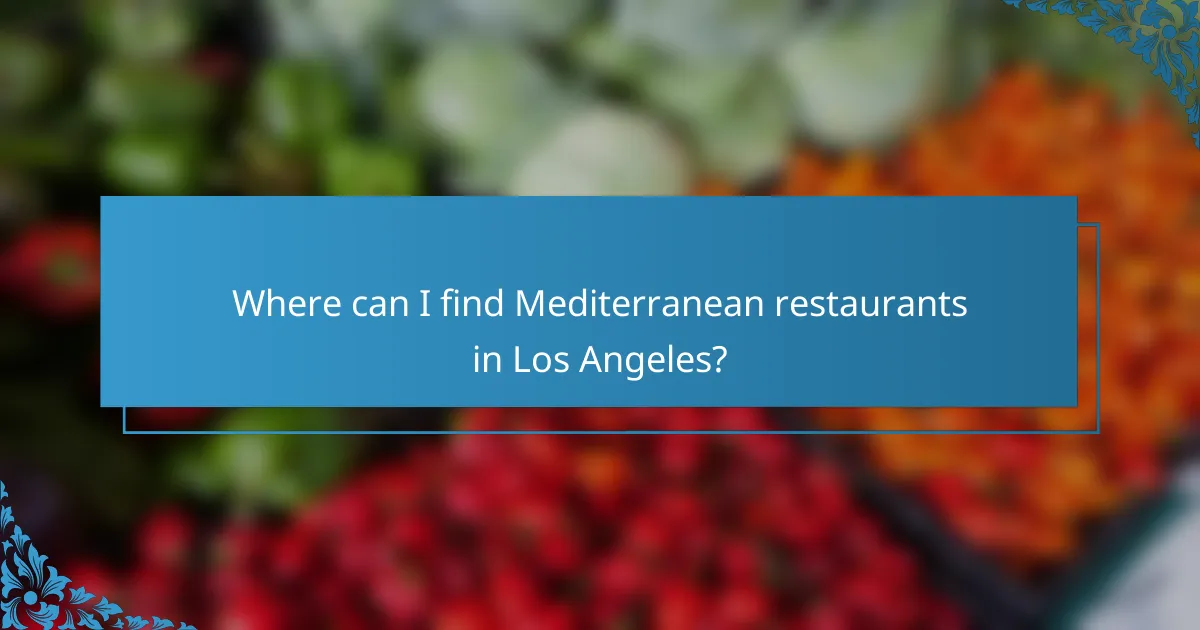
Where can I find Mediterranean restaurants in Los Angeles?
Los Angeles is home to a vibrant array of Mediterranean restaurants, offering diverse dishes that emphasize healthy fats, fresh produce, and communal dining. You can find these eateries scattered throughout the city, particularly in neighborhoods like Westwood, Santa Monica, and Silver Lake.
Top-rated local spots
Some of the top-rated Mediterranean restaurants in Los Angeles include “Kismet,” known for its innovative dishes and warm atmosphere, and “Zankou Chicken,” famous for its rotisserie chicken and garlic sauce. “Cafe Bizou” offers a more upscale dining experience with a focus on fresh ingredients and traditional recipes.
For a casual option, “The Great Greek” provides a variety of classic Mediterranean dishes in a relaxed setting. Each of these spots showcases the rich flavors and health benefits associated with Mediterranean cuisine.
Online reviews and ratings
Online platforms like Yelp and Google Reviews are valuable resources for assessing the quality of Mediterranean restaurants in Los Angeles. Many diners highlight the freshness of ingredients and the authenticity of flavors, often rating their experiences between four to five stars.
When checking reviews, pay attention to comments on specific dishes, service quality, and overall atmosphere. This can help you choose a restaurant that aligns with your preferences for healthy eating and enjoyable dining experiences.

What are the key ingredients in Mediterranean cooking?
The key ingredients in Mediterranean cooking include healthy fats, fresh produce, and a variety of proteins. These elements not only contribute to the cuisine’s rich flavors but also promote health benefits associated with a balanced diet.
Olive oil
Olive oil is a cornerstone of Mediterranean cooking, known for its heart-healthy monounsaturated fats. It is often used as a dressing, cooking oil, or flavor enhancer, providing a distinct taste that complements many dishes.
When selecting olive oil, look for extra virgin varieties, which are cold-pressed and retain more nutrients. Aim for a bottle that is dark in color to protect the oil from light, which can degrade its quality.
Fresh herbs
Fresh herbs are essential in Mediterranean cuisine, adding vibrant flavors and aromas to dishes. Common herbs include basil, oregano, thyme, and parsley, each contributing unique characteristics to meals.
Using fresh herbs instead of dried can significantly enhance the taste of your dishes. Consider growing your own herbs at home for easy access and maximum freshness.
Seafood
Seafood is a prominent protein source in Mediterranean cooking, particularly along coastal regions. Fish such as salmon, sardines, and anchovies are rich in omega-3 fatty acids, which are beneficial for heart health.
When choosing seafood, opt for sustainably sourced options to support environmental health. Aim to include seafood in your diet a couple of times a week for optimal health benefits.
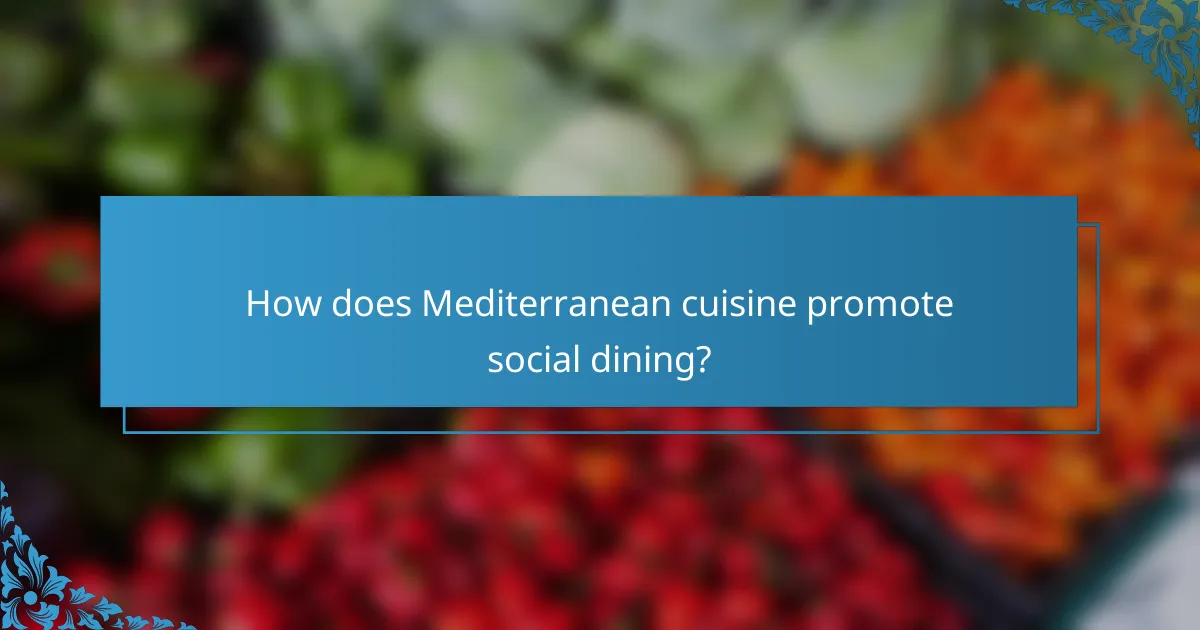
How does Mediterranean cuisine promote social dining?
Mediterranean cuisine fosters social dining through its emphasis on communal meals and shared experiences. The culture encourages people to gather around the table, enjoying a variety of dishes that promote interaction and connection.
Shared platters
Shared platters are a hallmark of Mediterranean dining, allowing diners to sample a range of flavors and textures. Dishes like mezze, which include hummus, olives, and grilled vegetables, are typically served on large plates for everyone to enjoy. This encourages conversation and a sense of togetherness as guests pass around the food.
When planning a meal, consider including a variety of shared platters to cater to different tastes. Aim for a mix of vegetarian and meat options, ensuring there are gluten-free choices as well. This approach not only enhances the dining experience but also accommodates dietary restrictions.
Family-style meals
Family-style meals further enhance the social aspect of dining by placing large bowls of food on the table for everyone to serve themselves. This method promotes a relaxed atmosphere where guests can help themselves and engage in conversation. Traditional dishes like paella or a hearty pasta serve as perfect centerpieces for such meals.
To create an inviting family-style dining experience, choose dishes that are easy to share and serve. Provide ample serving utensils and encourage guests to try a little bit of everything. This not only makes the meal more enjoyable but also allows for a variety of flavors to be experienced collectively.
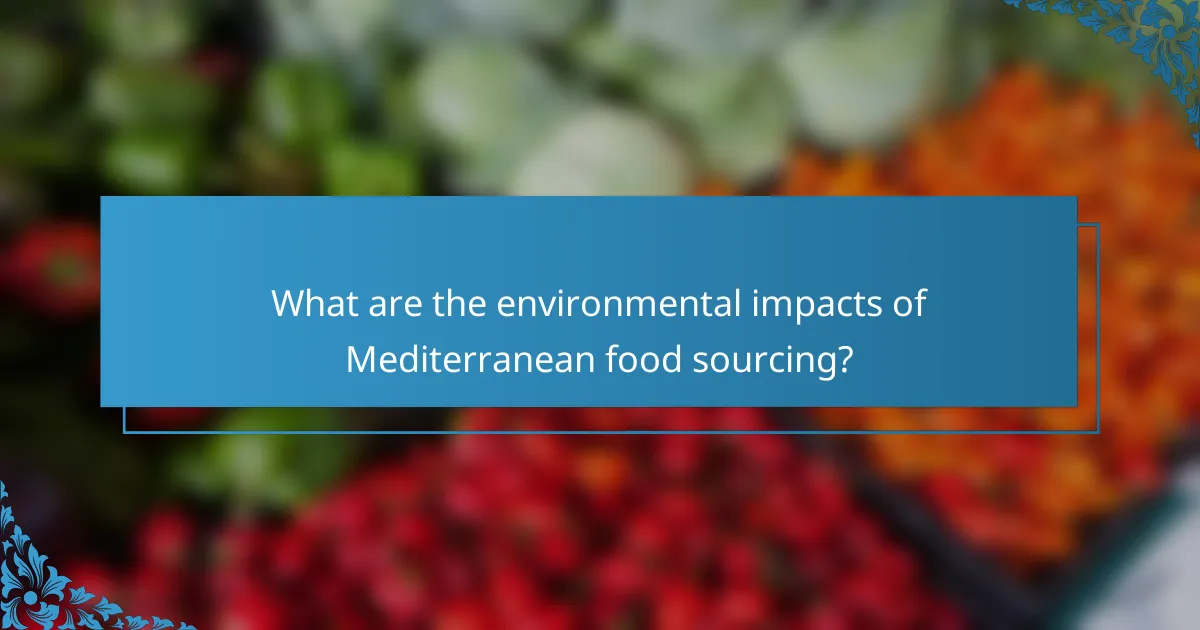
What are the environmental impacts of Mediterranean food sourcing?
The environmental impacts of Mediterranean food sourcing are significant, as they involve various agricultural practices, transportation methods, and resource management strategies. Sustainable sourcing can minimize negative effects while promoting biodiversity and reducing carbon footprints.
Water usage in Mediterranean agriculture
Water usage is a critical factor in Mediterranean agriculture, especially given the region’s climate, which can be arid. Efficient irrigation techniques, such as drip irrigation, help conserve water while maximizing crop yields. Farmers should aim for practices that reduce water waste, such as scheduling irrigation during cooler parts of the day.
Soil health and biodiversity
Maintaining soil health is essential for sustainable Mediterranean food sourcing. Practices like crop rotation and organic farming can enhance soil fertility and promote biodiversity. Farmers are encouraged to use cover crops and minimize chemical fertilizers to protect the ecosystem and improve long-term productivity.
Transportation and carbon footprint
The transportation of Mediterranean foods can significantly impact their carbon footprint. Local sourcing reduces the distance food travels, thereby lowering emissions. Consumers can support local farmers’ markets and seasonal produce to minimize environmental impacts while enjoying fresher options.
Impact of fishing practices
Fishing practices in the Mediterranean Sea have profound environmental implications, particularly concerning overfishing and habitat destruction. Sustainable fishing methods, such as using nets that minimize bycatch, are crucial for preserving marine ecosystems. Consumers should look for certifications like the Marine Stewardship Council (MSC) to ensure seafood is sourced responsibly.
